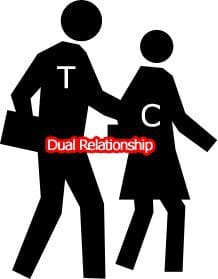
Ethical Considerations of Dual Relationships and Boundaries
The client and therapist relationship – how do clinicians navigate the possibility of a dual relationship? What ethical principles and standards should be considered? These are both important questions that will be addressed in this workshop on the ethical considerations of dual relationships. Learners will increase their ethical framework for exercising appropriate professional boundaries with clients and their relationships. Categories of dual relationships will be presented, and discussion will center on using critical thinking skills to identify best practices. Special consideration will be given to diversity in dual relationships, such as rural settings and racial and ethnic influences on dual relationships. Learners will have increased clinical judgment in identifying appropriate professional relationships with clients.
Upon completion of this training, participants will be able to:
- Identify qualities of dual relationships and at least three key considerations.
- Employ at least five strategies to have ethical boundaries and relationships with clients.
- Build confidence in assessing professional roles in ethical dilemmas involving dual relationships.
Social workers completing this course receive 3 Ethics asynchronous continuing education credits.
For other board approvals, this course qualifies for 3 hours of Ethics continuing education training.
Course Instructor: Diane Bigler, LCSW, LSCSW
Recording Date: 10/14/2024
Recorded Live Webinar with downloadable presentation slides and/or handouts, evaluation, and a required quiz. The learner is required to pass with a 70% or higher to achieve the CE certificate of completion. The learner is able to reset the test until a satisfactory score is achieved. CE Training Workshops, LLC, provider #1770, is approved as an ACE provider to offer social work continuing education by the Association of Social Work Boards (ASWB) Approved Continuing Education (ACE) program. Regulatory boards are the final authority on courses accepted for continuing education credit. ACE provider approval period: 8/2/2022 – 8/2/2025. CE Training Workshops, LLC has been approved by NBCC as an Approved Continuing Education Provider, ACEP No. 7091. Programs that do not qualify for NBCC credit are clearly identified. CE Training Workshops, LLC is solely responsible for all aspects of the programs. System Requirements: Firefox, Chrome, Brave, Safari, Edge on any modern operating system (Windows, MacOS, Linux, Android, iOS). A desktop browser is recommended. We do not provide support resources for issues encountered using a mobile device. For more information about our policies and board approval statements, please visit our FAQS page.
Diane Bigler, LCSW, LSCSW is a Licensed Clinical Social Worker in Missouri and Kansas with over 25 years of experience in the mental health field.
Ethical Considerations of Dual Relationships (3 HR) Syllabus
I. Introduction and Foundational Questions
- Define dual and multiple relationships in clinical practice
- Identify ethical concerns surrounding dual relationships
- Consider professional responses to client-initiated boundary questions
II. Core Ethical Standards and Frameworks
- Review NASW, APA, and NBCC codes on dual relationships
- Emphasize avoidance of harm, exploitation, and impaired objectivity
- Distinguish fiduciary, therapeutic, and relational responsibilities
III. Types and Contexts of Dual Relationships
- Understand social, professional, business, communal, institutional, forensic, supervisory, sexual, and digital contexts
- Explore dual relationships that are sequential or simultaneous
- Examine common examples including former clients, students, colleagues, and service exchanges
IV. Risk Considerations and Ethical Implications
- Recognize when dual relationships may be unethical versus clinically appropriate
- Understand potential harm, exploitation, or blurred boundaries
- Explore the continuum between boundary crossings and violations
V. Assessing Level of Involvement and Risk
- Evaluate intensity, duration, and impact of dual relationships
- Apply criteria such as client vulnerability, timing of contact, and nature of termination
VI. Decision-Making Models and Ethical Tools
- Use the Gottlieb Ethical Decision-Making Model
- Apply contextual and client-specific factors including culture, setting, and access to services
- Incorporate consultation, supervision, and documentation into practice
VII. Case Studies and Scenario Analysis
- Analyze cases involving social invitations, community overlap, and post-termination contact
- Consider ethical dilemmas in rural and small communities
- Review outcomes from a real malpractice case involving dual relationships
VIII. Special Populations and Cultural Considerations
- Discuss dual relationships in military, school, and religious settings
- Reflect on cultural humility and the importance of context in ethics
IX. Social Media and Digital Relationships
- Explore ethical risks of online presence and social networking
- Review Zur’s recommendations for social media boundaries
- Set clear expectations in informed consent and online conduct
X. Informed Consent and Policy Recommendations
- Clarify policies around incidental encounters and nonsexual dual relationships
- Emphasize transparency and mutual agreement about boundaries
- Develop language in consent forms that reflects ethical clarity
XI. Summary and Key Takeaways
- Not all dual relationships are unethical, but all require ethical scrutiny
- Focus on client welfare, objectivity, and clinical effectiveness
- Consult, reflect, and document when navigating dual relationship complexities


